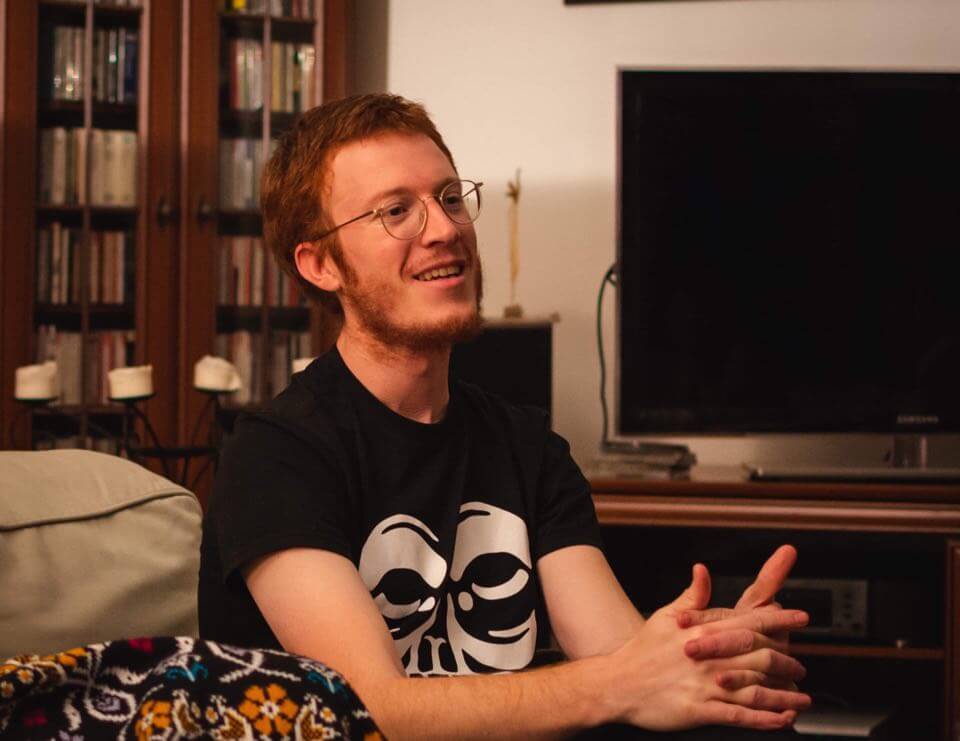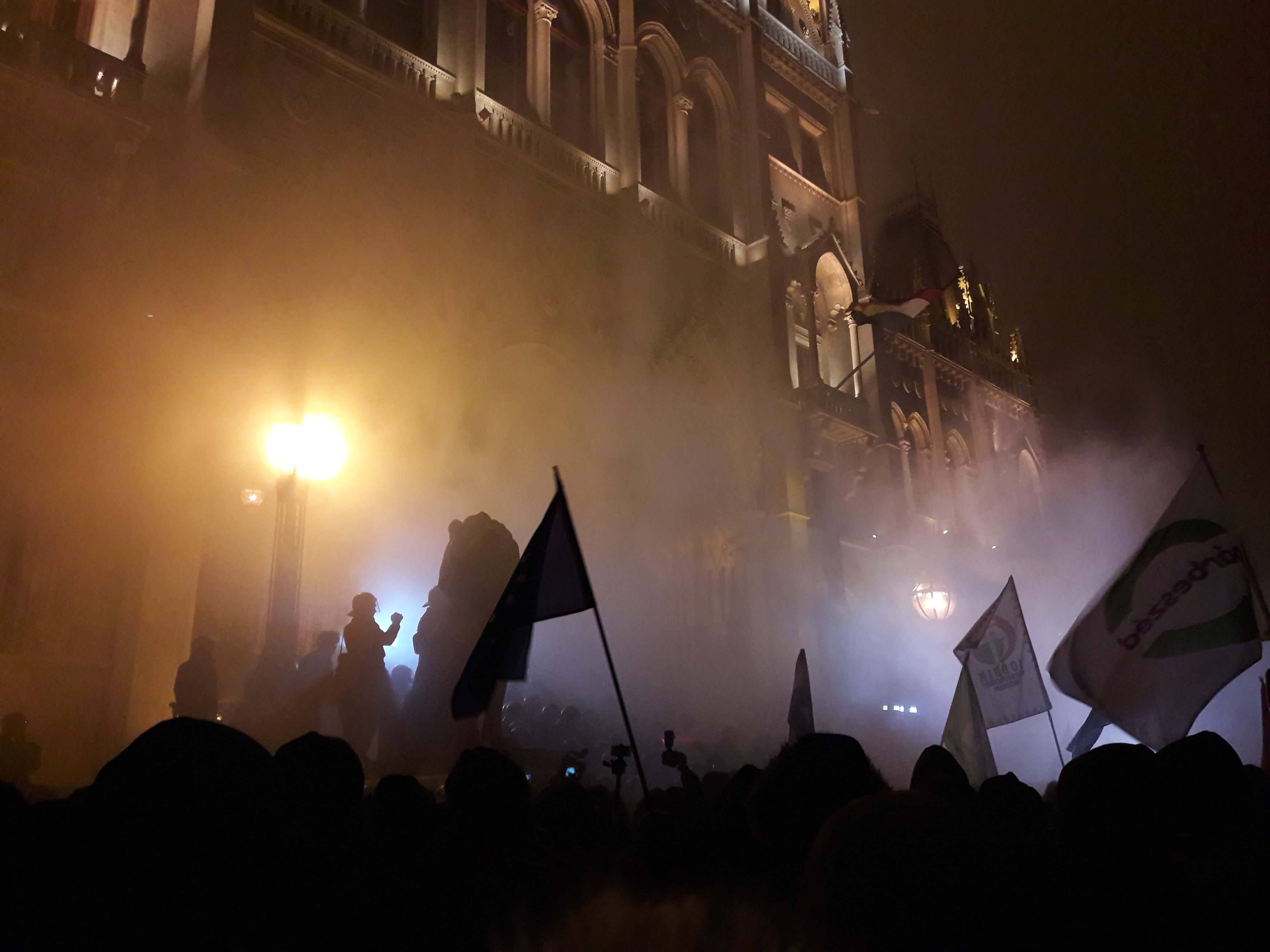I met Adrien Beauduin two years ago at the Klinika cultural centre in Prague, and since last year we are colleagues at the Central European University in Budapest. For the last week, Adrien has been all over the Hungarian and international media for different reasons. During one of the protests in Budapest, sparked by the new “slave law” allowing employers to force up to 400 hours of overtime yearly, he was randomly picked from the crowd by the police together with four other people, and after spending two days in detention charged with “felony against a public official committed in a gang” – a crime that he denies. Some state-supported media have been devoting much attention to Adrien, as being a Belgian-Canadian PhD student in Gender Studies at the “Soros-backed university” makes him a perfect enemy of this authoritarian government. While he awaits the trial, I spoke to him about the protests, detention, and the political climate in Central Europe.

Jakub Gawkowski: What happened on December 12th, when you protested in front of the Hungarian parliament?
Adrien Beauduin: I went to the demonstration because I had been voicing my disapproval of this new “slave law” for more than two weeks and I wanted to join fellow students to stand in solidarity with workers in Hungary. While it was mostly peaceful, there were some clashes between the police and protesters after 21:00, and the police used a lot of pepper spray, as well as their batons. At around 23:45, it had been calm for some time and I was about to go home when I wandered off a bit from my group of friends. I saw some people set fire to a sleigh that was part of the Christmas decoration, but I didn’t really pay attention to it, and went closer to the police line. There’s even a video of me standing there and showing no aggressive behavior.
What happened next?
Then the police decided to charge, and I was pushed towards other protesters, many of them falling, and some towards the small fire. I tried to regain my balance and went backwards towards the police – there I fell through the police line and felt the officers picking me up. I was brought under the arcades of the Parliament, and with four others (arrested before and after me) were sent to a police station far away. We had to stand for a long time without being allowed to go to the toilet, then we were taken for a urine test and only in the morning did we go to the prosecutor’s office. In the middle of the night, an interpreter was sent to me to help out.
How did you feel when you heard the charges?
After a sleepless night, I was absolutely shocked to hear that I was accused of group violence against police officers. It seemed so surreal. When my lawyer, Dr. Nehéz-Posony, sent to me by the Hungarian Civil Liberties Union, told me that such charges can lead to between 2–8 years in jail, I was devastated. I don’t think there’s a particular reason why I was arrested, I just tried to keep on my feet in this police charge and I ended up in the wrong place at the wrong time.
It is not obvious that a Belgian-Canadian PhD student would get involved in a protest of Hungarian workers. Why did you decide to take to the streets and join the protest?
Wherever I’ve lived, I have always stood up for causes that I find worthy. The working conditions of workers in Hungary are appalling, with long hours and low wages, and it was important for me to show my solidarity – as those conditions are about to become even worse. We already protested as a student group against this law on November 27th and on other occasions. The day I was arrested was the day the law was passed, and I thought I had to go and show that I disagree with it, and with the fact that it was passed with disregard for parliamentary procedures. Finally, the very same day, another law weakened the independence of courts, which was also a reason to protest.
After your arrest, you became a subject of reports of the pro-government media, which are describing you as a “Soros-activist.”
As soon as I was arrested I knew that the pro-government media would use my case for their propaganda. I don’t speak so much Hungarian and I tried to ignore the smear campaign, but of course I’m afraid that some people do believe it and might want to hurt me and others.
We started as a group who wanted to protest against the upcoming closure of the Central European University, but not only.
This wasn’t the first protest you joined in the last weeks in Budapest. Since October, you have been involved in the Szabad Egyetem (Free University) student movement, and you were one of the organizers of a week-long occupation of the parliament square.
We started as a group who wanted to protest against the upcoming closure of the Central European University, but not only. We wanted to address the new wave of attacks on academic freedom: the ban on gender studies in October 2018, censorship at the Academy of Sciences, budget cuts, and plans to privatize Corvinus University. We reached out to other students and organizations and tried to find allies. After a big demonstration on November 24th, we occupied the square in front of the Parliament for the last week before our university would be chased out of the country. Despite the rain, the cold, and the snow, we managed to organize an Open University, where we celebrated academic freedom with classes and lectures with professors from many Hungarian universities, in both Hungarian and English. We also had a forum to help build a new Student Trade Union.
How did the Szabad Egyetem and the students behind it join the struggle of Hungarian workers?
When we heard about the planned “slave law,” we immediately thought that we needed to stand in solidarity with the workers. While it seems like it’s not a common thing to do in Hungary, many of us from other countries are used to linking struggles such as student and worker movements. The Hungarian students and the trade unions were very enthusiastic, and we moved forward with it, building more ties and trust. We think the trade unions appreciate our solidarity and our loud presence at their events, and we hope that students and workers can help each other in defending their rights.
The protests reached this scale of social mobilization for the first time in years, but that did not stop the government. President János Áder signed the bill, and the “slave law” comes into force on 1 January 2019. Does that mean all the protests were for nothing?
Personally, I never thought that any of our actions had any chance of direct success: I knew we wouldn’t prevent the closure of CEU, I knew we wouldn’t get back the accreditation for Gender Studies, I knew we wouldn’t get back universities’ autonomy, I knew that we wouldn’t prevent this law from being passed. But I think that we’re all showing that all these things are not normal, that universities should not be shut down and that people should get a decent wage while working normal hours. We all hope that we’re building a larger movement that will lead to a free, educated, and just society.

You’re Belgian-Canadian, but, in fact, one of the few people who I can describe as Central-European. Before coming to Budapest, you lived in Prague and Warsaw, and as a researcher and activist you are very much involved in what is happening in the region. Have the recent events changed your perspective on Hungary and the region?
Indeed, I’m lucky that I lived in three of the four countries of the Visegrad region, and I have seen how the region is changing. After the unquestionable pro-Western, neoliberal positions ruling until the early 2010s, there has been a shift which opened up some possibilities. Unfortunately, the criticism of the post-socialist era has been appropriated by right-wing and far-right forces such as Orbán or Kaczyński – but I also see opportunities for other political and social forces. Hence, we are now seeing a revival of trade unions in the region: the teachers’ strike and the Volkswagen strike in Slovakia, the strike at Tesco in Hungary, threats of strike at Škoda in the Czech Republic, the ongoing teachers’ strike in Lithuania, and now this unprecedented trade union mobilization in Hungary.
Do you consider it a chance to counter populist authoritarianism?
For the moment, there are few political alternatives on the parliamentary level to escape the nationalist–liberal dilemma, but perhaps social forces such as trade unions and student movements can be the beginning of positive changes in the region. Already, it feels like the government propaganda on “Soros agents” is starting to lose steam, as more and more people start to understand that Soros is not responsible for their low wages and that migrants are not the ones making life difficult at the end of the month.
Do you feel welcome in Hungary now?
Personally, I am afraid about a tiny minority of Fidesz fanatics who might want to attack me and others, but I am receiving tremendous support from ordinary Hungarian citizens and thus I do feel at home here.
Are you worried about the upcoming trial?
Yes, of course, I am. Unless we finally find full footage of my arrest, it might just be my word against the police officers’. I am afraid that the way I was targeted by the pro-government media and the broader political context might play against me. I also don’t see strong reactions by other EU governments to what is happening in Hungary, and I’m afraid that there isn’t any international attention to those facing heavy charges in Hungarian courts now.
***
Adrien Beauduin is a PhD student in Gender Studies at Central European University. He also holds an MA in Gender Studies from Central European University, MA in European Affairs from College of Europe in Warsaw, MA in Political Science from University College London and Charles University in Prague, as well as BA in History from McGill University, Montréal.
![Political Critique [DISCONTINUED]](http://politicalcritique.org/wp-content/uploads/2015/09/Political-Critique-LOGO.png)
![Political Critique [DISCONTINUED]](http://politicalcritique.org/wp-content/uploads/2015/09/Political-Critique-LOGO-2.png)